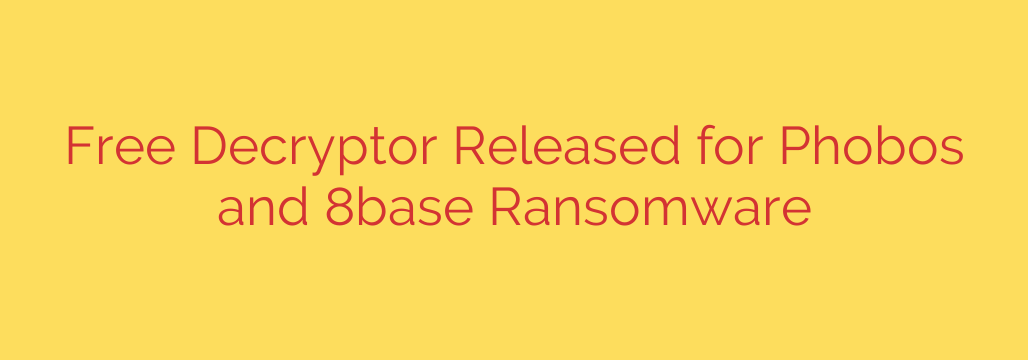
How to Recover Your Files: Free Phobos & 8base Ransomware Decryptor Now Available
In a significant development for cybersecurity, a free decryption tool has been released, offering a lifeline to victims of the notorious Phobos and 8base ransomware families. This breakthrough provides a way for many affected businesses and individuals to recover their encrypted files without paying a ransom.
Ransomware attacks are a crippling threat, locking away critical data and demanding hefty payments for its return. For those hit by Phobos and its variants, the situation often seemed hopeless. Now, there is a powerful new option for recovery.
Understanding the Threat: Phobos and 8base Ransomware
Phobos ransomware first emerged in 2019 and quickly became known for targeting small to medium-sized businesses (SMBs). Its operators typically gain access to networks through vulnerabilities in Remote Desktop Protocol (RDP) connections. Once inside, they encrypt files, append a unique ID and a specific extension (like .phobos, .devos, or .eight), and leave a ransom note demanding payment.
The 8base ransomware group, which saw a surge in activity in mid-2023, has been identified as using variants of Phobos ransomware in their attacks. While they present themselves as a separate entity, the technical similarities in their malware are undeniable, linking them directly to the Phobos family.
A Decryptor Offers New Hope for Victims
The newly available decryptor is a game-changer for those whose systems were compromised by specific versions of this malware.
A free decryption tool is now available for certain versions of Phobos and 8base ransomware. This is possible because cybersecurity researchers were able to identify and exploit a flaw in the ransomware’s encryption implementation, allowing them to create a tool that can reverse the process for known keys.
It is crucial to understand that this tool will not work for all Phobos or 8base victims. Ransomware operators frequently update their malware, and newer versions may use different, unbroken encryption keys. However, for those whose files were encrypted by a recognized variant, this tool represents a complete and cost-free recovery solution.
How to Safely Recover Your Encrypted Files
If you have been a victim of a Phobos or 8base attack, follow these steps carefully to attempt file recovery:
- Isolate the Infected Systems: Immediately disconnect the affected computers from the network to prevent the ransomware from spreading further.
- Do Not Delete the Encrypted Files or Ransom Note: The decryptor may need the ransom note or sample encrypted files to identify the specific ransomware variant and the correct decryption key.
- Back Up Your Encrypted Data: Before running any recovery tool, create a complete backup of the encrypted files. This is a critical safety measure in case the decryption process fails or corrupts the data.
- Locate and Use the Official Decryptor: Search for the official Phobos decryptor released by trusted, well-known cybersecurity organizations. Only download recovery tools from their official websites to avoid downloading fake or malicious software.
- Follow the Instructions: Carefully follow the instructions provided with the decryption tool. Most decryptors are designed to be user-friendly, but attention to detail is essential for a successful recovery.
Proactive Defense: The Best Ransomware Strategy
While this decryptor is a significant victory for cyber defense, the best strategy is always prevention. Ransomware attacks are preventable with a strong security posture. Here are essential security tips to protect your organization:
- Secure Remote Desktop Protocol (RDP): Since this is the primary attack vector for Phobos, secure it without compromise. Disable RDP if it is not needed. If it is required, place it behind a VPN, use strong and unique passwords, and enforce multi-factor authentication (MFA).
- Maintain Regular, Offline Backups: The most effective defense against any ransomware is having recent, tested backups. Follow the 3-2-1 rule: keep at least three copies of your data, on two different types of media, with one copy stored offline or off-site.
- Implement a Patch Management Program: Consistently update your operating systems, software, and applications. This closes security holes before threat actors can exploit them.
- Enhance Email Security: Train employees to recognize and report phishing emails, which are a common entry point for all types of malware.
- Use Advanced Endpoint Protection: Modern antivirus and Endpoint Detection and Response (EDR) solutions can detect and block the malicious behaviors associated with ransomware attacks before they can execute.
The release of this free decryptor is a welcome relief for many. However, the fight against ransomware requires constant vigilance. By adopting robust security practices, you can significantly reduce your risk and ensure your data remains safe from threat actors.
Source: https://securityaffairs.com/180108/malware/authorities-released-free-decryptor-for-phobos-and-8base-ransomware.html








